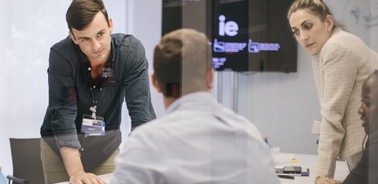- Home
- News And Events
- What’s Going On
- Ie Hosts Ft Workshop On Future-proofing Professionals In The Age Of Disruption
IE hosts FT workshop on future-proofing professionals in the age of disruption

The most valuable skill in an era of constant change? Learning how to learn, argues IE’s David Suarez.
IE Business School’s David Suarez [recently] hosted a workshop for the Financial Times’ Future of Business Education series, where he shared powerful insights into the business skills needed in a world defined by extraordinary change.
Suarez, Vice Dean of IE’s International MBA and Master in Management programs, suggested that technological convergence and the exponential growth of computing power are causing the world to change faster now than at any other point in the 250,000 years of human history.
“The amount of time that particular knowledge prevails is becoming shorter and shorter,” said Suarez. “And that poses a question for anyone who wants to educate themselves: what is it really that we need to study in the context of such a high degree of disruption?”
Drawing not only on his role at IE, but his more than 25 years working around the globe in consulting for companies like PricewaterhouseCoopers and Deloitte, as well as his own experience earning an MBA at IE Business School, Suarez outlined his vision for how business leaders can best future-proof themselves at this unique moment of time.
“In a world where knowledge is changing so quickly, the best thing you can do for yourself is probably to learn how to learn,” he said.
The Evolving Role of Higher Education by David Suárez - Skills
For this, he explained the four main categories of skills that students should focus on developing: cognitive, self-development, relationship-centered, and tech and digital.
“It’s not really the know-how as much as it is the know-who, especially given the new ways of collaboration in the post-pandemic world,” he quipped. To illustrate, he said it isn’t necessary to have a deep understanding of coding, but it is critical to be aware of what technology is capable of doing and who is wielding that power.
He also broke down what this age of disruption means for business educators.
The Evolving Role of Higher Education by David Suárez - Disruption
Suarez argued that it’s critical to strike the right balance between developing professionals with a cross-disciplinary understanding of various fields while meeting the market demand for a depth of knowledge. That’s why, he said, IE’s MBA program has recently moved to offering students a greater degree of specialization after giving them time to explore their options and a broad understanding of leadership.
Technological shifts are also leaving their mark on what learning looks like. Hybrid and flexible models are here to stay, he said, also emphasizing how real-world, hands-on experiences continue to grow in importance.
Curation has also become one of business schools’ most essential tasks, he explained. The deluge of information means that business educators need to be excellent curators of knowledge, adept at guiding students on their individual paths while leaving space for students to make their own choices.
The Evolving Role of Higher Education by David Suárez - Implications
“It’s about enabling students to go through a journey of self-transformation. We’ve embedded in our MBA programs a lot more time to think about what you want to do with your life, how you want to improve, and how we focus on your strengths to ensure you move to a better place,” Suarez explained.
He summarized IE’s unique focus on creating ‘The Next Best You,’ which involves helping individual students define their career goals, refine impact skills and find passion and meaning in business activities.
The Evolving Role of Higher Education by David Suárez - Practice
For the 2023 Future of Business Education series, FT partnered with the world’s top business schools to explore how ambitious individuals can enhance their global skillset and accelerate their careers.
“It’s about enabling students to go through a journey of self-transformation. We’ve embedded in our MBA programs a lot more time to think about what you want to do with your life, how you want to improve, and how we focus on your strengths to ensure you move to a better place.”
David Suarez, Vice Dean of IE Business School’s International MBA Master in Management